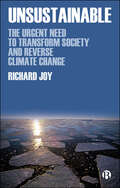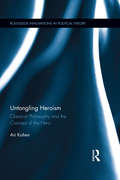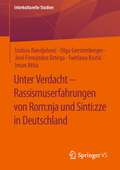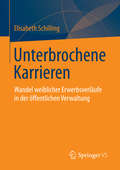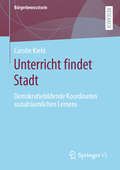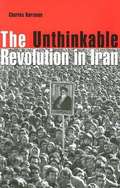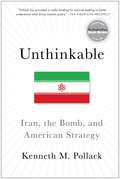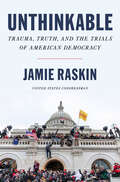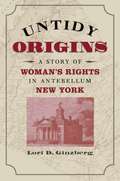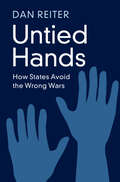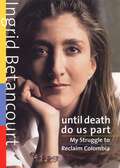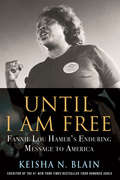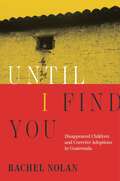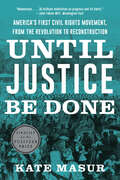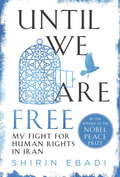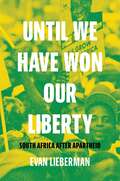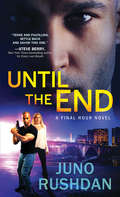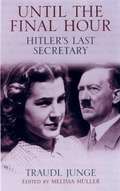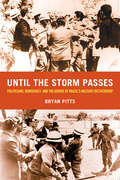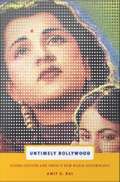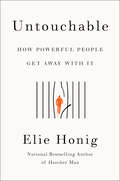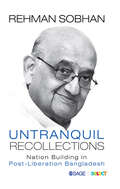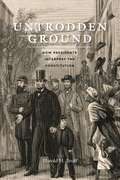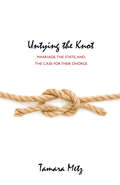- Table View
- List View
Unsustainable: The Urgent Need to Transform Society and Reverse Climate Change
by Richard JoyThis book is an urgent call to reimagine our social, political and economic systems so that we might transform to a sustainable society. It considers whether an alternative economic model is possible and examines the factors needed to enable such a transition to occur. The scale and pace of change is unprecedented and the author examines the actions that have to be taken by governments, business and individuals if we are to address the environmental disaster that confronts us. Much needs to change but ultimately, this is a book of hope, believing that evolution to a better, more sustainable society is possible.
Untangling Heroism: Classical Philosophy and the Concept of the Hero (Routledge Innovations in Political Theory)
by Ari KohenThe idea of heroism has become thoroughly muddled today. In contemporary society, any behavior that seems distinctly difficult or unusually impressive is classified as heroic: everyone from firefighters to foster fathers to freedom fighters are our heroes. But what motivates these people to act heroically and what prevents other people from being heroes? In our culture today, what makes one sort of hero appear more heroic than another sort? In order to answer these questions, Ari Kohen turns to classical conceptions of the hero to explain the confusion and to highlight the ways in which distinct heroic categories can be useful at different times. Untangling Heroism argues for the existence of three categories of heroism that can be traced back to the earliest Western literature – the epic poetry of Homer and the dialogues of Plato – and that are complex enough to resonate with us and assist us in thinking about heroism today. Kohen carefully examines the Homeric heroes Achilles and Odysseus and Plato’s Socrates, and then compares the three to each other. He makes clear how and why it is that the other-regarding hero, Socrates, supplanted the battlefield hero, Achilles, and the suffering hero, Odysseus. Finally, he explores in detail four cases of contemporary heroism that highlight Plato’s success. Kohen states that in a post-Socratic world, we have chosen to place a premium on heroes who make other-regarding choices over self-interested ones. He argues that when humans face the fact of their mortality, they are able to think most clearly about the sort of life they want to have lived, and only in doing that does heroic action become a possibility. Kohen’s careful analysis and rethinking of the heroism concept will be relevant to scholars across the disciplines of political science, philosophy, literature, and classics.
Unter Verdacht – Rassismuserfahrungen von Rom:nja und Sinti:zze in Deutschland (Interkulturelle Studien)
by Iman Attia Isidora Randjelović Olga Gerstenberger José Fernández Ortega Svetlana KostićRom:nja und Sinti:zze berichten von Ausschlüssen, Barrieren und Gewalt in allen Lebenssituationen. Das community-basierte Forschungsprojekt zeigt die Wirkungsweisen dieses spezifischen Rassismus auf, ebenso wie die historischen Kontinuitäten und Nachwirkungen, die Allgegenwart und die alltäglichen Folgen für das Leben von Rom:nja und Sinti:zze. Die Rekonstruktion des Geflechts ineinandergreifender Praktiken zeigt eindrücklich, dass Rassismus auch kumulativ wirkt und zu einer Spirale von Diskriminierung führen kann. Das Buch schließt mit Empfehlungen für verschiedene Politikbereiche.
Unterbrochene Karrieren
by Elisabeth SchillingDas Buch analysiert, wie Beschäftigte der öffentlichen Verwaltung mit unterbrochenen Erwerbsverläufen ihr Arbeitsleben gestalten, welche Bedeutung Partizipation in der Arbeitswelt für sie hat, wie sie beruflichen Erfolg definieren und die Balance zwischen dem Beruflichen und dem Privaten herstellen. Der Analyse liegt eine qualitative Studie mit biographischen Interviews zugrunde. Frauen erzählten über ihre Erfahrungen des Aus- und Wiedereinstiegs, über ihre Wünsche, Hindernisse auf dem Weg zur Verwirklichung dieser Wünsche und Realitäten im Arbeitsalltag. Durch die Vorstellung der Typologie von Übergangserfahrungen werden diese Erkenntnisse systematisiert und für den Leser greifbar gemacht. Zum Schluss werden Vorschläge für spezifische Personalentwicklungsmaßnahmen gemacht.
Unterricht findet Stadt: Demokratiebildende Koordinaten sozialräumlichen Lernens (Bürgerbewusstsein)
by Carolin KiehlDas vorliegende Buch untersucht das Verhältnis zwischen demokratiebildendem Lernen und sozialräumlichen Spezifika im Kontext einer Gesellschaft der Vielfalt. Ausgehend vom Verständnis einer reflexiven, heterogenen und zu Teilen widersprüchlichen Gesellschaft werden fächerübergreifende Kompetenzen erhoben, welche als Facetten von Mündigkeit verstanden werden können. Dabei wird der Begriff des "Sozialraums" über das Quartierverständnis hinaus erweitert als relationaler Raum und figurativer Ausschnitt von Gesellschaft beschrieben. Im Bewusstsein einer lebensweltnahen Demokratiebildung entwickelt sich der Sozialraum dabei zum Koordinatensystem, aus welchem sich Gütekriterien, fördernde, aber auch hemmende Faktoren eines demokratiebildenden, sozialräumlichen Unterrichts ableiten lassen. Ausgehend von Prozessen der produktiven Realitätsverarbeitung und einer Theorie reflexiver Modernisierung wird Lernen als reflexiver und bewusster Vorgang im Verhältnis von innerer und äußerer Realität sowie im Kontext von Wissen und Nicht-Wissen untersucht. Die Analyse gibt Empfehlungen für verschiedene Fachdidaktiken, beschreibt sozialräumliches Lernen jedoch zugleich als reflektierenden Sozialisationsprozess, der zwar in Schule Verankerung findet, aber zugleich für ein lebenslanges Lernen außerhalb des schulischen Sozialraums spricht.
Unthinkable
by Charles KurzmanThe shah of Iran, Mohammad Reza Pahlavi, would remain on the throne for the foreseeable future: This was the firm conclusion of a top-secret CIA analysis issued in October 1978. One hundred days later the shah--despite his massive military, fearsome security police, and superpower support was overthrown by a popular and largely peaceful revolution. But the CIA was not alone in its myopia, as Charles Kurzman reveals in this penetrating work; Iranians themselves, except for a tiny minority, considered a revolution inconceivable until it actually occurred. Revisiting the circumstances surrounding the fall of the shah, Kurzman offers rare insight into the nature and evolution of the Iranian revolution and into the ultimate unpredictability of protest movements in general. As one Iranian recalls, "The future was up in the air. " Through interviews and eyewitness accounts, declassified security documents and underground pamphlets, Kurzman documents the overwhelming sense of confusion that gripped pre-revolutionary Iran, and that characterizes major protest movements. His book provides a striking picture of the chaotic conditions under which Iranians acted, participating in protest only when they expected others to do so too, the process approaching critical mass in unforeseen and unforeseeable ways. Only when large numbers of Iranians began to "think the unthinkable," in the words of the U. S. ambassador, did revolutionary expectations become a self-fulfilling prophecy. A corrective to 20-20 hindsight, this book reveals shortcomings of analyses that make the Iranian revolution or any major protest movement seem inevitable in retrospect.
Unthinkable: Iran, the Bomb, and American Strategy
by Kenneth M. PollackIn Unthinkable, Kenneth Pollack, a former CIA analyst with twenty-five years of experience working on the Middle East, explores America's intractable problem with Iran, Tehran's pursuit of a nuclear weapons capability, and the prolonged clash that led us to this point. Pollack lays out key solutions to the Iran nuclear question, explaining and assessing the options for American policymakers: <P> * Redoubling our efforts at a carrot-and-stick approach that combines negotiations and sanctions <P> * Aiding the Iranian opposition to bring about a popular form of regime change <P> * An Israeli military strike <P> * The American military option <P> * Containing a nuclear Iran <P> Insightful, powerful, and balanced in its approach, Unthinkable is one of the most thoughtful and important books on foreign policy in the past decade.
Unthinkable: Trauma, Truth, and the Trials of American Democracy
by Jamie RaskinIn this searing memoir, Congressman Jamie Raskin tells the story of the forty-five days at the start of 2021 that permanently changed his life—and his family’s—as he confronted the painful loss of his son to suicide, lived through the violent insurrection in our nation’s Capitol, and led the impeachment effort to hold President Trump accountable for inciting the political violence. <p><p> On December 31, 2020, Tommy Raskin, the only son of Maryland Congressman Jamie Raskin, tragically took his own life after a long struggle with depression. Seven days later on January 6, Congressman Raskin returned to Congress to help certify the 2020 Presidential election results, when violent insurrectionists led by right wing extremist groups stormed the U.S. Capitol hoping to hand four more years of power to President Donald Trump. <p><p> As our reeling nation mourned the deaths of numerous people and lamented the injuries of more than 140 police officers hurt in the attack, Congressman Raskin, a Constitutional law professor, was called upon to put aside his overwhelming grief—both personal and professional—and lead the impeachment effort against President Trump for inciting the violence. Together this nine-member team of House impeachment managers riveted a nation still in anguish, putting on an unprecedented Senate trial that produced the most bipartisan Presidential impeachment vote in American history. <p><p> Now for the first time, Congressman Raskin discusses this unimaginable convergence of personal and public trauma, detailing how the painful loss of his son and the power of Tommy’s convictions fueled the Congressman’s work in the aftermath of modern democracy’s darkest day. Going inside Congress on January 6, he recounts the horror of that day, a day that he and other Democrats had spent months preparing for under the correct assumption that they would encounter an attempted electoral coup—not against a President but for one. And yet, on January 6, he faced the one thing he had failed to anticipate: mass political violence designed to block Biden’s election. <p><p> With an inside account of leading the team prosecuting President Trump in the Senate, Congressman Raskin shares never before told stories of just how close we came to losing our democracy that fateful day and lays out the methodical prosecution that convinced Democrats and Republicans alike of Trump’s responsibility for inciting insurrectionary violence against our government. <p><p> Through it all, he reckons with the loss of his brilliant, remarkable son, a Harvard Law student whose values and memory continually inspired the Congressman to confront the dark impulses unleashed by Donald Trump. At turns, a moving story of a father coping with his pain and a revealing examination of holding President Trump accountable for the violence he fomented, this book is a vital reminder of the ongoing struggle for the soul of American democracy and the perseverance that our Constitution demands from us all.
Untidy Origins
by Lori D. GinzbergOn a summer day in 1846--two years before the Seneca Falls convention that launched the movement for woman's rights in the United States--six women in rural upstate New York sat down to write a petition to their state's constitutional convention, demanding "equal, and civil and political rights with men." Refusing to invoke the traditional language of deference, motherhood, or Christianity as they made their claim, the women even declined to defend their position, asserting that "a self evident truth is sufficiently plain without argument." Who were these women, Lori Ginzberg asks, and how might their story change the collective memory of the struggle for woman's rights?Very few clues remain about the petitioners, but Ginzberg pieces together information from census records, deeds, wills, and newspapers to explore why, at a time when the notion of women as full citizens was declared unthinkable and considered too dangerous to discuss, six ordinary women embraced it as common sense. By weaving their radical local action into the broader narrative of antebellum intellectual life and political identity, Ginzberg brings new light to the story of woman's rights and of some women's sense of themselves as full members of the nation.
Untied Hands: How States Avoid the Wrong Wars
by Dan ReiterHow do states advance their national security interests? Conventional wisdom holds that states must court the risk of catastrophic war by 'tying their hands' to credibly protect their interests. Dan Reiter overturns this perspective with the compelling argument that states craft flexible foreign policies to avoid unwanted wars. Through a comprehensive analysis of key international crises, including the Berlin, Taiwan Straits, and Cuban Missile Crises, and the Korean and Vietnam Wars, Reiter provides new perspectives on the causes of wars, the role of international alliances, foreign troop deployments, leader madness, and the impact of AI on international relations. With critical insights into contemporary foreign policy challenges, such as America's role in NATO, the risks of war with China, containing a resurgent Russia, and the dangers of nuclear war, Untied Hands is essential reading for anyone interested in understanding how states can effectively manage international crises while avoiding the wrong wars.
Until Death Do Us Part: My Struggle to Reclaim Colombia
by Ingrid BetancourtIngrid Betancourt, a senator and a presidential candidate in Colombia, grew up among diplomats, literati, and artists who congregated at her parents' elegant home in Paris, France. Her father served as Colombia's ambassador to UNESCO and her mother, a political activist, continued her work on behalf of the country's countless children whose lives were being destroyed by extreme poverty and institutional neglect. Intellectually, Ingrid was influenced by Pablo Neruda and other Latin American writers like Gabriel García Márquez, who frequented her parents' social circle. She studied at École de Sciences Politiques de Paris, a prestigious academy in France.From this charmed life, Ingrid Betancourt -- not yet thirty, happily married to a French diplomat, and a mother of two children -- returned to her native country in the late 1980s. On what was initially just a visit, she found her country under internal siege from the drug cartels and the corrupt government that had allowed them to flourish. After seeing what had become of Colombia's democracy, she didn't feel she could leave.Until Death Do Us Part is the deeply personal story of a woman who gave up a life of comfort and safety to become a political leader in a country being slowly demolished by terrorism, violence, fear, and a pervasive sense of hopelessness. It is a country where democracy has been sacrificed for the well-being of the few, where international criminals determine policy, and where political assassinations are a way of life. Now forty, Ingrid Betancourt has been elected and reelected as a representative and as a senator in Colombia's national legislature. She has founded a political party that has openly confronted Colombia's leaders and has earned the respect of a nation. And now she has become a target of the establishment and the drug cartels behind it.Forced to move her children out of Colombia for protection against death threats, Ingrid Betancourt remained and continued to fight the political structure that has crumbled under the destructive power of the paramilitary forces, the financial omnipotence of the drug cartels, and the passivity of governmentfor-sale. Here is a political cocktail that has destroyed countless lives in Colombia and has spread to countries beyond its borders.A memoir of a life in politics that reads like a fastpaced political thriller, Until Death Do Us Part -- already an international bestseller -- is a hair-raising account of one woman's fight against the establishment. It is a story of a woman whose love for her country and faith in democracy gave her the courage to stand up to the power that has subjugated, intimidated, or corrupted all those who opposed it. A chilling account of the dangerous, byzantine machine that runs Colombia, it is also an inspiring story of privilege, sacrifice, and true patriotism.
Until I Am Free: Fannie Lou Hamer's Enduring Message to America
by Keisha N. BlainMs. Magazine &“Most Anticipated Reads for the Rest of Us --2021&” * KIRKUS STARRED REVIEW* BOOKLIST STARRED REVIEW * PW Big Indie Books of Fall 2021 Explores the Black activist&’s ideas and political strategies, highlighting their relevance for tackling modern social issues including voter suppression, police violence, and economic inequality.&“We have a long fight and this fight is not mine alone, but you are not free whether you are white or black, until I am free.&”—Fannie Lou HamerA blend of social commentary, biography, and intellectual history, Until I Am Free is a manifesto for anyone committed to social justice. The book challenges us to listen to a working-poor and disabled Black woman activist and intellectual of the civil rights movement as we grapple with contemporary concerns around race, inequality, and social justice.Award-winning historian and New York Times best-selling author Keisha N. Blain situates Fannie Lou Hamer as a key political thinker alongside leaders such as Martin Luther King Jr., Malcolm X, and Rosa Parks and demonstrates how her ideas remain salient for a new generation of activists committed to dismantling systems of oppression in the United States and across the globe.Despite her limited material resources and the myriad challenges she endured as a Black woman living in poverty in Mississippi, Hamer committed herself to making a difference in the lives of others. She refused to be sidelined in the movement and refused to be intimidated by those of higher social status and with better jobs and education. In these pages, Hamer&’s words and ideas take center stage, allowing us all to hear the activist&’s voice and deeply engage her words, as though we had the privilege to sit right beside her.More than 40 years since Hamer&’s death in 1977, her words still speak truth to power, laying bare the faults in American society and offering valuable insights on how we might yet continue the fight to help the nation live up to its core ideals of &“equality and justice for all.&”Includes a photo insert featuring Hamer at civil rights marches, participating in the Democratic National Convention, testifying before Congress, and more.
Until I Find You: Disappeared Children and Coercive Adoptions in Guatemala
by Rachel NolanThe poignant saga of Guatemala’s adoption industry: an international marketplace for children, built on a foundation of inequality, war, and Indigenous dispossession.In 2009 Dolores Preat went to a small Maya town in Guatemala to find her birth mother. At the address retrieved from her adoption file, she was told that her supposed mother, one Rosario Colop Chim, never gave up a child for adoption—but in 1984 a girl across the street was abducted. At that house, Preat met a woman who strongly resembled her. Colop Chim, it turned out, was not Preat’s mother at all, but a jaladora—a baby broker.Some 40,000 children, many Indigenous, were kidnapped or otherwise coercively parted from families scarred by Guatemala’s civil war or made desperate by unrelenting poverty. Amid the US-backed army’s genocide against Indigenous Maya, children were wrested from their villages and put up for adoption illegally, mostly in the United States. During the war’s second decade, adoption was privatized, overseen by lawyers who made good money matching children to overseas families. Private adoptions skyrocketed to the point where tiny Guatemala overtook giants like China and Russia as a “sender” state. Drawing on government archives, oral histories, and a rare cache of adoption files opened briefly for war crimes investigations, Rachel Nolan explores the human toll of an international industry that thrives on exploitation.Would-be parents in rich countries have fostered a commercial market for children from poor countries, with Guatemala becoming the most extreme case. Until I Find You reckons with the hard truths of a practice that builds loving families in the Global North out of economic exploitation, endemic violence, and dislocation in the Global South.
Until Justice Be Done: America's First Civil Rights Movement, From The Revolution To Reconstruction
by Kate MasurA groundbreaking history of the movement for equal rights that courageously battled racist laws and institutions, Northern and Southern, in the decades before the Civil War. The half-century before the Civil War was beset with conflict over equality as well as freedom. Beginning in 1803, many free states enacted laws that discouraged free African Americans from settling within their boundaries and restricted their rights to testify in court, move freely from place to place, work, vote, and attend public school. But over time, African American activists and their white allies, often facing mob violence, courageously built a movement to fight these racist laws. They countered the states’ insistences that states were merely trying to maintain the domestic peace with the equal-rights promises they found in the Declaration of Independence and the Constitution. They were pastors, editors, lawyers, politicians, ship captains, and countless ordinary men and women, and they fought in the press, the courts, the state legislatures, and Congress, through petitioning, lobbying, party politics, and elections. Long stymied by hostile white majorities and unfavorable court decisions, the movement’s ideals became increasingly mainstream in the 1850s, particularly among supporters of the new Republican party. When Congress began rebuilding the nation after the Civil War, Republicans installed this vision of racial equality in the 1866 Civil Rights Act and the Fourteenth Amendment. These were the landmark achievements of the first civil rights movement. Kate Masur’s magisterial history delivers this pathbreaking movement in vivid detail. Activists such as John Jones, a free Black tailor from North Carolina whose opposition to the Illinois “black laws” helped make the case for racial equality, demonstrate the indispensable role of African Americans in shaping the American ideal of equality before the law. Without enforcement, promises of legal equality were not enough. But the antebellum movement laid the foundation for a racial justice tradition that remains vital to this day.
Until We Are Free
by Shirin EbadiThe first Muslim woman to receive the Nobel Peace Prize, Shirin Ebadi has inspired millions around the globe through her work as a human rights lawyer defending women and children against a brutal regime in Iran. Now Ebadi tells her story of courage and defiance in the face of a government out to destroy her, her family, and her mission: to bring justice to the people and the country she loves. For years the Islamic Republic tried to intimidate Ebadi, but after Mahmoud Ahmadinejad rose to power in 2005, the censorship and persecution intensified. The government wiretapped Ebadi's phones, bugged her law firm, sent spies to follow her, harassed her colleagues, detained her daughter, and arrested her sister on trumped-up charges. It shut down her lectures, fired up mobs to attack her home, seized her offices, and nailed a death threat to her front door. Despite finding herself living under circumstances reminiscent of a spy novel, nothing could keep Ebadi from speaking out and standing up for human dignity. But it was not until she received a phone call from her distraught husband--and he made a shocking confession that would all but destroy her family--that she realized what the intelligence apparatus was capable of to silence its critics. The Iranian government would end up taking everything from Shirin Ebadi--her marriage, friends, and colleagues, her home, her legal career, even her Nobel Prize--but the one thing it could never steal was her spirit to fight for justice and a better future. This is the amazing, at times harrowing, simply astonishing story of a woman who would never give up, no matter the risks. Just as her words and deeds have inspired a nation, Until We Are Free will inspire you to find the courage to stand up for your beliefs.Advance praise for Until We Are Free"Shirin Ebadi is quite simply the most vital voice for freedom and human rights in Iran."--Reza Aslan, author of No god but God and Zealot "Shirin Ebadi writes of exile hauntingly and speaks of Iran, her homeland, as the poets do. Ebadi is unafraid of addressing the personal as well as the political and does both fiercely, with introspection and fire."--Fatima Bhutto, author of The Shadow of the Crescent Moon "I would encourage all to read Dr. Shirin Ebadi's memoir and to understand how her struggle for human rights continued after winning the Nobel Peace Prize. It is also fascinating to see how she has been affected positively and negatively by her Nobel Prize. This is a must read for all."--Desmond Tutu"Ebadi's courage and strength of character are evident throughout this engrossing text, which illuminates the power the few have had over the many, particularly the women and children of Iran. The captivating and candid story of a woman who took on the Iranian government and survived, despite every attempt to make her fail."--Kirkus Reviews Praise for Shirin Ebadi's Iran Awakening "[A] moving portrait of a life lived in truth."--The New York Times Book Review "A riveting account of a brave, lonely struggle . . . reads like a police thriller, its drama heightened by Ebadi's determination to keep up the quotidian aspects of her family life."--The Washington Post Book World "A must-read . . . may be the most important book you could read this year."--Seattle Post-Intelligencer "[Ebadi] has risked her freedom and her life to defend democracy, free speech, and the rule of law."--The Boston GlobeFrom the Hardcover edition.
Until We Have Won Our Liberty: South Africa after Apartheid
by Evan LiebermanA compelling account of South Africa’s post-Apartheid democracyAt a time when many democracies are under strain around the world, Until We Have Won Our Liberty shines new light on the signal achievements of one of the contemporary era’s most closely watched transitions away from minority rule. South Africa’s democratic development has been messy, fiercely contested, and sometimes violent. But as Evan Lieberman argues, it has also offered a voice to the voiceless, unprecedented levels of government accountability, and tangible improvements in quality of life.Lieberman opens with a first-hand account of the hard-fought 2019 national election, and how it played out in Mogale City, a post-Apartheid municipality created from Black African townships and White Afrikaner suburbs. From this launching point, he examines the complexities of South Africa’s multiracial society and the unprecedented democratic experiment that began with the election of Nelson Mandela in 1994. While acknowledging the enormous challenges many South Africans continue to face—including unemployment, inequality, and discrimination—Lieberman draws on the country’s history and the experience of comparable countries to demonstrate that elected Black-led governments have, without resorting to political extremism, improved the lives of millions. In the context of open and competitive politics, citizens have gained access to housing, basic services, and dignified treatment to a greater extent than during any prior period.Countering much of the conventional wisdom about contemporary South Africa, Until We Have Won Our Liberty offers hope for the enduring impact of democratic ideals.
Until the End (Final Hour #3)
by Juno Rushdan"Juno Rushdan is the real deal. Every Last Breath is an electric combination of heart-stopping thriller and swoon-worthy romance."—LEXI BLAKE, New York Times bestselling authorHe's strong. Fierce. Relentless.And he may be her only chance of surviving the night.Gray Box operative Castle Kinkade always gets the job done, no matter how tough the assignment. But when he agrees to protect white-hat hacker Kit Westcott, Castle's loyalty is tested like never before. Trapped in the closest of quarters, protective instincts flaring, he can feel the ice surrounding his heart melt...and he knows he'd do anything to keep Kit safe.Even defy the rules that shaped his life.Castle is the last person Kit should confide in, let alone be attracted to, but he's the only ally she has left. Under threat of imminent attack—and a chilling conspiracy that hits too close to home—Castle and Kit are forced to put their hearts and lives on the line...and stop at nothing to face the greatest danger the world has ever known.The Final Hour Series:Every Last BreathNothing to FearUntil the EndWhat People Are Saying About Juno Rushdan:"Tense and fulfilling. Settle back and savor this one."—STEVE BERRY, New York Times bestselling author"Fast-paced, intense, and sexy—a must-read romantic suspense!"—CYNTHIA EDEN, New York Times and USA Today bestselling author"A fast-paced, spine-tingling thriller you won't want to put down!"—LAURA GRIFFIN, New York Times bestselling author"An unputdownable thrill ride."—LEXI BLAKE, New York Times bestselling author"A romantic thriller that handily juggles emotional intensity and a heart-pounding, James Bond-ian adventure."—Kirkus
Until the Final Hour: Hitler's Last Secretary
by Anthea Bell Melissa Muller Traudl JungeIn 1942 Traudl Junge was offered the chance of a lifetime. At the age of twenty-two she became private secretary to Adolf Hitler, and she served him for two and a half years, up to the bitter end.
Until the Storm Passes: Politicians, Democracy, and the Demise of Brazil’s Military Dictatorship
by Bryan PittsA free open access ebook is available upon publication. Learn more at www.luminosoa.org.Until the Storm Passes reveals how Brazil's 1964–1985 military dictatorship contributed to its own demise by alienating the civilian political elites who initially helped bring it to power. Based on exhaustive research conducted in nearly twenty archives in five countries, as well as on oral histories with surviving politicians from the period, this book tells the surprising story of how the alternatingly self-interested and heroic resistance of the political class contributed decisively to Brazil's democratization. As they gradually turned against military rule, politicians began to embrace a political role for the masses that most of them would never have accepted in 1964, thus setting the stage for the breathtaking expansion of democracy that Brazil enjoyed over the next three decades.
Untimely Bollywood: Globalization and India's New Media Assemblage
by Amit S. RaiKnown for its elaborate spectacle of music, dance, costumes, and fantastical story lines, Bollywood cinema is a genre that foregrounds narrative rupture, indeterminacy, and bodily sensation. In Untimely Bollywood, Amit S. Rai argues that the fast-paced, multivalent qualities of contemporary Bollywood cinema are emblematic of the changing conditions of media consumption in a globalizing India. Through analyses of contemporary media practices, Rai shifts the emphasis from a representational and linear understanding of the effects of audiovisual media to the multiple, contradictory, and evolving aspects of media events. He uses the Deleuzian concept of assemblage as a model for understanding the complex clustering of technological, historical, and physical processes that give rise to contemporary media practices. Exploring the ramifications of globalized media, he sheds light on how cinema and other popular media organize bodies, populations, and spaces in order to manage the risky excesses of power and sensation and to reinforce a liberalized postcolonial economy. Rai recounts his experience of attending the first showing of a Bollywood film in a single-screen theater in Bhopal: the sensory experience of the exhibition space, the sound system, the visual style of the film, the crush of the crowd. From that event, he elicits an understanding of cinema as a historically contingent experience of pleasure, a place where the boundaries of identity and social spaces are dissolved and redrawn. He considers media as a form of contagion, endlessly mutating and spreading, connecting human bodies, organizational structures, and energies, thus creating an inextricable bond between affect and capital. Expanding on the notion of media contagion, Rai traces the emerging correlation between the postcolonial media assemblage and capitalist practices, such as viral marketing and the development of multiplexes and malls in India.
Untouchable: How Powerful People Get Away with It
by Elie HonigA NEXT BIG IDEA CLUB 'MUST-READ'CNN senior legal analyst and nationally bestselling author Elie Honig explores America’s two-tier justice system, explaining how the rich, the famous, and the powerful— including, most notoriously, Donald Trump—manipulate the legal system to escape justice and get away with vast misdeeds.How does he get away with it? That question, more than any other, vexes observers of and participants in the American criminal justice process. How do powerful people weaponize their wealth, political power, and fame to beat the system? And how can prosecutors fight back?In Untouchable, Elie Honig exposes how the rich and powerful use the system to their own benefit, revealing how notorious figures like Donald Trump, Jeffrey Epstein, Harvey Weinstein, and Bill Cosby successfully eluded justice for decades. He demonstrates how the Trump children dodged a fraud indictment. He makes clear how countless CEOs and titans of Wall Street have been let off the hook, receiving financial penalties without suffering criminal consequences. This doesn’t happen by accident.Over the four years of his administration, Donald Trump’s corruption seemed plain for all to see. The former president obstructed justice, flouted his responsibility to the Constitution, lied to the American people, and set the United States on a dark path to disunity and violence. Yet he has never been held accountable for any of his misdeeds. Why not?Untouchable holds the answer. Honig shows how Trump and others use seemingly fair institutions and practices to build empires of corruption and get away with misdeeds for which ordinary people would be sentenced to years behind bars. It’s not just that money talks, Honig makes clear, but how it can corrupt otherwise reliable institutions and blind people to the real power dynamics behind the scenes.In this vital, incisive book, Honig explains how the system allows the powerful to become untouchable, takes us inside their heads, and offers solutions for making the system more honest and fairer, ensuring true justice for all—holding everyone, no matter their status, accountable for their criminal misdeeds.
Untranquil Recollections: Nation Building in Post-Liberation Bangladesh
by Rehman SobhanRehman Sobhan was directly associated with Bangladesh’s liberation struggle. In this memoir, he provides an insightful, first-hand account of the challenges faced by the newly independent Bangladesh in the early years of its existence. This book attempts to capture the unique problems of reconstructing the war-devastated economy while building institutions from ground up for a nation which for 24 years had been run through a highly centralized system of colonial-style governance. Untranquil Recollections gives special attention to the author’s involvement, as a Member of the Planning Commission, in addressing the problem of reconstruction while coping with the political challenges associated with building institutions, formulating economic policies and overseeing their implementation. The narrative attempts to identify the economic and political forces that were inimical to the radical direction of the national policy set by Prime Minister Sheikh Mujibur Rahman. The book concludes with a discussion of the dark events leading to Mujibur Rahman’s assassination along with his family and his closest political colleagues, which resulted in a change in the regime.
Untrodden Ground: How Presidents Interpret the Constitution
by Harold H. BruffWhen Thomas Jefferson struck a deal for the Louisiana Purchase in 1803, he knew he was adding a new national power to those specified in the Constitution, but he also believed his actions were in the nation’s best interest. His successors would follow his example, setting their own constitutional precedents. Tracing the evolution and expansion of the president’s formal power, Untrodden Ground reveals the president to be the nation’s most important law interpreter and examines how our commanders-in-chief have shaped the law through their responses to important issues of their time. Reviewing the processes taken by all forty-four presidents to form new legal precedents and the constitutional conventions that have developed as a result, Harold H. Bruff shows that the president is both more and less powerful than many suppose. He explores how presidents have been guided by both their predecessors’ and their own interpretations of constitutional text, as well as how they implement policies in ways that statutes do not clearly authorize or forbid. But while executive power has expanded far beyond its original conception, Bruff argues that the modern presidency is appropriately limited by the national political process—their actions are legitimized by the assent of Congress and the American people or rejected through debilitating public outcry, judicial invalidation, reactive legislation, or impeachment. Synthesizing over two hundred years of presidential activity and conflict, this timely book casts new light on executive behavior and the American constitutional system.
Untying the Knot: Marriage, the State, and the Case for Their Divorce
by Tamara MetzMarriage is at the center of one of today's fiercest political debates. Activists argue about how to define it, judges and legislators decide who should benefit from it, and scholars consider how the state should protect those who are denied it. Few, however, ask whether the state should have anything to do with marriage in the first place. In Untying the Knot, Tamara Metz addresses this crucial question, making a powerful argument that marriage, like religion, should be separated from the state. Rather than defining or conferring marriage, or relying on it to achieve legitimate public welfare goals, the state should create a narrow legal status that supports all intimate caregiving unions. Marriage itself should be bestowed by those best suited to give it the necessary ethical authority--religious groups and other kinds of communities. Divorcing the state from marriage is dictated by nothing less than basic commitments to freedom and equality. Tracing confusions about marriage to tensions at the heart of liberalism, Untying the Knot clarifies today's debates about marriage by identifying and explaining assumptions hidden in widely held positions and common practices. It shows that, as long as marriage and the state are linked, marriage will be a threat to liberalism and the state will be a threat to marriage. An important and timely rethinking of the relationship between marriage and the state, Untying the Knot will interest political theorists, legal scholars, policymakers, sociologists, and anyone else who cares about the fate of marriage or liberalism.
Unused Power: The Work of the Senate Committee on Appropriations
by Stephen HornAnalyzes the work and possibilities of the Appropriations Committee at the time of the writing--1970.
